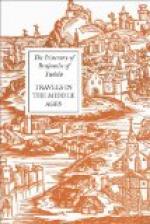The inhabitants neither sow nor reap. They possess only one well, and there is no stream in the whole island, but they drink rain-water. The merchants who come from India and the islands encamp there with their wares. Moreover, men from Shinar, El-Yemen and Persia bring thither all sorts of silk, purple and flax, cotton, hemp, worked wool, wheat, barley, millet, rye, and all sorts of food, and lentils of every description, and they trade with one another, whilst the men from India bring great quantities of spices thither. The islanders act as middlemen, and earn their livelihood thereby. There are about 500 Jews there.
Thence it is ten days’ journey by sea to Katifa, where there are about 5,000 Jews. Here the bdellium is to be found[171]. On the twenty-fourth of Nisan rain falls upon the water, upon the surface of which certain small sea-animals float which drink in the rain and then shut themselves up, and sink to the bottom.
[p.90]
And about the middle of Tishri men descend to the bed of the sea by ropes, and collect these shell-fish, then split them open and extract the pearls. This pearl-fishery belongs to the King of the country, but is controlled by a Jewish official.
Thence it is seven days’ journey to Khulam which is the beginning of the country of the Sun-worshippers[172]. These are the sons of Cush, who read the stars, and are all black in colour. They are honest in commerce. When merchants come to them from distant lands and enter the harbour, three of the King’s secretaries go down to them and record their names, and then bring them before the King, whereupon the King makes himself responsible even for their property which they leave in the open, unprotected. There is an official who sits in his office, and the owner of any lost property has only to describe it to him when he hands it back. This custom prevails in all that country. From Passover to New Year, that is all during the summer, no man can go out of his house because of the sun, for the heat in that country is intense, and from the third hour of the day onward, everybody remains in his house till the evening. Then they go forth and kindle lights in all the market places and all the streets, and then do their work and business at night-time.
[p.91]
For they have to turn night into day in consequence of the great heat of the sun. Pepper is found there. They plant the trees thereof in the fields, and each man of the city knows his own plantation. The trees are small, and the pepper is as white as snow. And when they have collected it, they place it in saucepans and pour boiling water over it, so that it may become strong. They then take it out of the water and dry it in the sun, and it turns black. Calamus and ginger and many other kinds of spice are found in this land.
The people of this country do not bury their dead, but embalm them by means of various spices, after which they place them on chairs and cover them with fine linen. And each family has a house where it preserves the embalmed remains of its ancestors and relations. The flesh hardens on the bones, and the embalmed bodies look like living beings, so that every man can recognize his parents, and the members of his family for many years.




